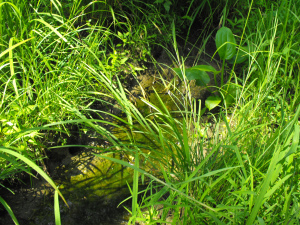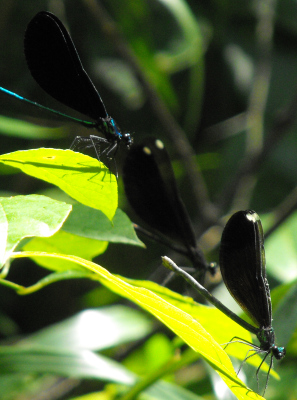
Our actions have consequences
 Every
morning, I walk our dog through the floodplain and
peer at
puddles. A few months ago, high waters stranded baby fish in
ephemeral pools, puddles that are bound to dry up before the summer
ends. My first instinct was to scoop these babies out and carry
them back to the creek, but then I paused to consider the consequences
of my actions.
Every
morning, I walk our dog through the floodplain and
peer at
puddles. A few months ago, high waters stranded baby fish in
ephemeral pools, puddles that are bound to dry up before the summer
ends. My first instinct was to scoop these babies out and carry
them back to the creek, but then I paused to consider the consequences
of my actions.
While it seems like a
good idea to save the minnows, how do I know that
these stranded fish aren't part of another animal's life cycle?
Do crawdads depend on pools like this for easy prey or do tree roots
need the quick burst of nitrogen left behind as the minnows' bodies
break down in the parched puddle?
 And
what if moving those fish back to the
creek disrupts the ecosystem there? Will I singlehandedly
overpopulate the stream, lowering reproductive rates of the other
fish? What if my minnows are better competitors but are actually
less fit because their offspring will be more likely to drift into
puddles and die without continued human intervention?
And
what if moving those fish back to the
creek disrupts the ecosystem there? Will I singlehandedly
overpopulate the stream, lowering reproductive rates of the other
fish? What if my minnows are better competitors but are actually
less fit because their offspring will be more likely to drift into
puddles and die without continued human intervention?
In the end, I left the
puddles alone, choosing to let the fish die
rather than setting off a chain reaction, the results of which I can't
begin to
predict. The experience sent me off on a thought tangent, though,
one that ballooned out into a lunchtime series (even though the
lunchtime series is supposed to be on summer vacation.) This
week's topic is pretty controversial and is bound to make many of you
decidedly uncomfortable, so I hope you'll bear with me rather than
jumping to the wrong conclusions. In fact, I'll even make you
wait until tomorrow to learn the theme. How's that for a teaser?
| This post is part of our Ethics of Vegetarianism lunchtime series.
Read all of the entries: |
Want more in-depth information? Browse through our books.
Or explore more posts by date or by subject.
About us: Anna Hess and Mark Hamilton spent over a decade living self-sufficiently in the mountains of Virginia before moving north to start over from scratch in the foothills of Ohio. They've experimented with permaculture, no-till gardening, trailersteading, home-based microbusinesses and much more, writing about their adventures in both blogs and books.
Want to be notified when new comments are posted on this page? Click on the RSS button after you add a comment to subscribe to the comment feed, or simply check the box beside "email replies to me" while writing your comment.
- Remove comment
- Remove comment
- Remove comment

- Remove comment
